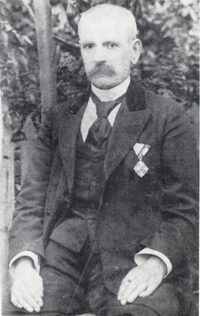Loading AI tools
Bulgarian folklorist and ethnographer From Wikipedia, the free encyclopedia
Kuzman Anastasov Shapkarev (Bulgarian and Macedonian: Кузман Анастасов Шапкарев, romanized: Kuzman Anastasov Šapkarev; 1 January 1834 – 18 March 1909) was a Bulgarian[1][2][3] folklorist and ethnographer from the Ottoman region of Macedonia, author of textbooks and ethnographic studies, and a figure of the Bulgarian National Revival.
Kuzman Shapkarev | |
|---|---|
 Kuzman Shapkarev decorated with the Bulgarian Order "For Civil Merit",
5th Class | |
| Native name | Кузман Шапкарев |
| Born | 1 February 1834 Ohrid, Manastir Vilayet, Ottoman Empire |
| Died | 18 March 1909 (aged 75) Sofia, Bulgaria |
| Occupation | Writer, publicist, teacher, folklorist |
| Language | Bulgarian |
| Period | Bulgarian National Revival |
| Spouse | Elisaveta Miladinova-Shapkareva (d. 1870) Ekaterina Shapkareva |
| Children | Kliment Shapkarev, Ivan Shapkarev |

Kuzman Shapkarev was born in Ohrid in 1834.[4] Shapkarev initially studied under his uncle Yanaki Strezov.[5] He was a teacher in a number of Bulgarian schools in Ohrid, Bitola, Prilep, Kukush, Thessaloniki, (1854–1883). In these towns, he was especially active in introducing the Bulgarian language in local schools. Не initiated the establishment of two Bulgarian high schools (Bulgarian men's high school and Bulgarian girls' high school) in Thessaloniki in the 1880s.[6]
He wrote the following textbooks: "A Bulgarian Primer" (1866), "A Big Bulgarian Reader" (1868), "Mother tongue" (1874), "Short Land description (Geography)" (1868), "Short Religion Book" (1868), which were published in Istanbul.[4] Shapkarev criticized the dominance of eastern Bulgarian and even declared that it was incomprehensible in Macedonia. In his Great Bulgarian Textbook (Golema balgarska chitanka) from 1868, which he authored under the pseudonym "One Macedonian" (Edin Makedonets), he stated his intention to write in a language understandable to his compatriots, the Macedonian Bulgarians. He also announced a project of a dictionary that would contain translation from Macedonian into Upper Bulgarian and vice versa. This activity was condemned by the Bulgarian press, which even accused him of advocating the existence of a separate Macedonian language and a distinct history of the Macedonian people.[7][8] Bulgarian philologist Marin Drinov rejected his proposal for a mixed eastern and western Bulgarian (Macedonian) basis of the Bulgarian standard language.[7]
Shapkarev was a contributor of many Bulgarian newspapers and magazines – "Tsarigradski vestnik" (Constantinople newspaper), "Gayda" (Bagpipe), "Macedonia", "Pravo" (Justice), "Savetnik" (Adviser), "Balgarska pchela" (Bulgarian bee) and others. Shapkarev was a collaborator of the revolutionary Georgi Rakovski and in the field of ethnography, he assisted the Miladinov brothers.
He married Dimitar Miladinov's daughter Elisaveta Miladinova but she died in 1870.[9] After 1883 he lived in Eastern Rumelia and Bulgaria – in Plovdiv, Sliven, Stara Zagora, Vraca and Orhanie (Botevgrad). Along with his scientific and public occupation in Bulgaria, he worked as a notary and a judge.
From 1900 he was a regular member of the Bulgarian Literary Society.[5] He died in 1909.[4]
His autobiographical book is called "Materials for the Revival of Bulgarian national spirit in Macedonia".
His first son Kliment Shapkarev was one of the leading activists of Internal Macedonian Revolutionary Organization,[10] while the second – Ivan Shapkarev was a high-ranking Bulgarian Army officer. His grandson Petar Shapkarev was a prominent Bulgarian economist and chairman of the Macedonian Scientific Institute,[5] while his great-grandson Mihail Shapkarev was a prominent Bulgarian sculptor.
He is an important figure in the Bulgarian and Macedonian historical narrative.[7] Shapkarev Buttress on the Fallières Coast, Antarctica, is named after Kuzman Shapkarev. The Kuzman Shapkarev Secondary Schoo, one of the first specialized high schools in Sofia, carries his name.

Seamless Wikipedia browsing. On steroids.
Every time you click a link to Wikipedia, Wiktionary or Wikiquote in your browser's search results, it will show the modern Wikiwand interface.
Wikiwand extension is a five stars, simple, with minimum permission required to keep your browsing private, safe and transparent.